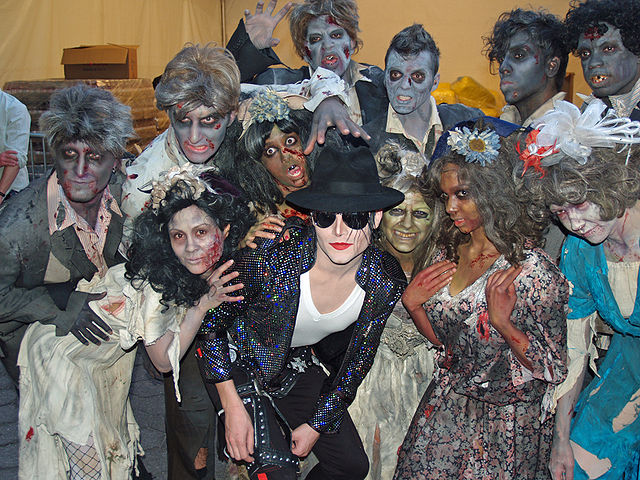Impersonator
Art form or criminal act From Wikipedia, the free encyclopedia
An impersonator is someone who imitates or copies the behavior or actions of another.[1] There are many reasons for impersonating someone:
- Living history: After close study of some historical figure, a performer may dress and speak "as" that person for an audience. Such historical interpretation may be a scripted dramatic performance like Mark Twain Tonight! or an unscripted interaction while staying in character.[2]
- Entertainment: An "impressionist" impersonates well-known figures in order to entertain an audience. Especially popular objects of impersonation are Elvis Presley (see Elvis impersonator), Michael Jackson (see Michael Jackson impersonator) and Madonna (see Madonna impersonator). Other uses of impersonation for entertainment include male drag queens (previously called "female impersonators", although this terminology is now considered outdated.)
- Crime: As part of a criminal act such as identity theft. This is usually where the criminal is trying to assume the identity of another, in order to commit fraud, such as accessing confidential information, or to gain property not belonging to them. Also known as social engineering and impostors.
- Decoys, used as a form of protection for political and military figures. This involves an impersonator who is employed (or forced) to perform during public appearances, to mislead observers.
- Sowing discord, causing people to fight, or dislike each other for social, business or political gain.
This article has multiple issues. Please help improve it or discuss these issues on the talk page. (Learn how and when to remove these messages)
|




Celebrity impersonators


Celebrity impersonators are impostors who look similar to celebrities and dress in such a way as to imitate them. Impersonators are known as sound-alikes, look-alikes, impressionists, imitators, tribute artists, and wannabees. The interest may have originated with the need or desire to see a celebrity who has died.[citation needed] One of the most prominent examples of this phenomenon is the case of Elvis Presley. Edward Moss has appeared in movies and sitcoms, impersonating Michael Jackson.[3][4] Tom Jones has attracted his share of impersonators from different places around the world. From the United States, to South East Asia, to the UK, there are performers who either sound like him or imitate his act.[5][6][7][8]
Criminal impersonation
Summarize
Perspective
In England and Wales, the Poor Law Amendment Act 1851, section 3, made it an offence to impersonate a "person entitled to vote" at an election. In the case of Whiteley v Chappell (1868), the literal rule of statutory interpretation was employed to find that a dead person was not a "person entitled to vote" and consequently a person accused of this offence was acquitted.[9]
Although in a Colorado case, an immigrant was charged with "criminal impersonation" for using another person's Social Security number when signing up for a job,[citation needed] some courts have ruled that supplying this wrong information may not be criminal.[10] The ruling hinges on whether there was harm to the other person.[citation needed]
Impersonation using Deepfake
Audio deepfakes have been used as part of social engineering scams, fooling people into thinking they are receiving instructions from a trusted individual.[11] In 2019, a U.K.-based energy firm's CEO was scammed over the phone when he was ordered to transfer €220,000 into a Hungarian bank account by an individual who used audio deepfake technology to impersonate the voice of the firm's parent company's chief executive.[12]
As of 2023, the combination advances in deepfake technology, which could clone an individual's voice from a recording of a few seconds to a minute, and new text generation tools, enabled automated impersonation scams, targeting victims using a convincing digital clone of a friend or relative.[13]
See also
- Impressionist
- Look-alike
- Personation
- Police impersonation
- Shi (personator), in the Chinese ancestor ritual: a figure impersonating ancestors
- Soundboard, victim soundboard
- Tribute act
- Wannabe
- Identity fraud
- Identity theft
References
Wikiwand - on
Seamless Wikipedia browsing. On steroids.
